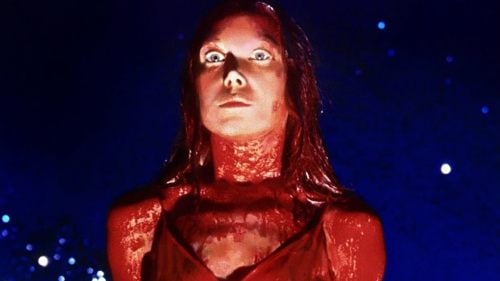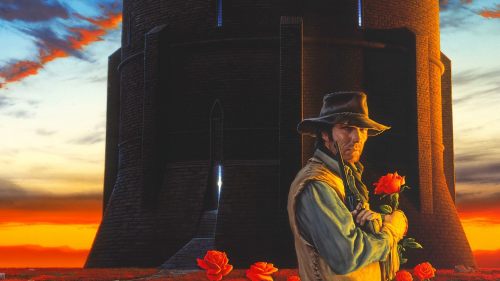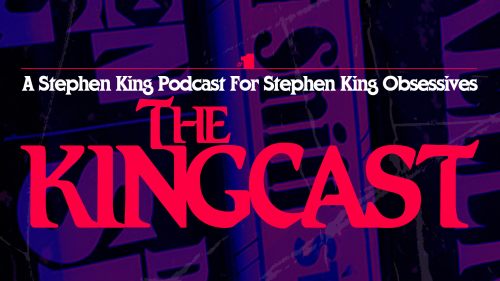The Great Debate: THE DARK TOWER And Stephen King Adaptations
Welcome back to The Great Debate, in which two critics discuss the pros and cons of a recent film and YOU, the audience, give us your opinions in the comments and an online poll. Today I'm so proud to go head-to-head with film critic for SlashFilm, Thrillist, HelloBeautiful and, of course, BMD - Candice Frederick!
Friday we saw the long-awaited release of The Dark Tower, an adaptation of one of Stephen King's best-loved properties that was, to say the least, pretty unsuccessful. So unsuccessful as to make me rethink the entire concept of a Stephen King adaptation? Maybe!
Read on as Candice argues FOR Stephen King film adaptations, and I argue AGAINST. If you haven't seen The Dark Tower yet, get your tickets ASAP so you can participate below!
First up, Candice:

We don’t talk enough about the fact that Stephen King has kept horror in the zeitgeist for more than four decades. This hasn’t been a solo feat, of course, but what other author has managed to dominate the conversation on multiple platforms (TV, film and books) for this long? Don’t worry, I’ll wait. He’s a voracious writer, scaring up tales that dig far beyond the stereotypical blood and gore too often associated with the genre. He makes us think twice about the world around us, the seemingly normal yet painfully shy teen in school or what could be lurking in the mist. He does it in a way that makes you want to revisit it over and over again, which makes his stories ripe for the big screen.
On the one hand, as a Stephen King superfan, I am automatically interested in any adaptation that attempts to explore the many layers of the human condition found in each of his books. On the other hand, of course I have some skepticism. I don’t want to see any of these books ruined by poor direction, writing or acting. Frankly, if a filmmaker doesn’t fully understand the source material, he or she has no business taking it on. But I digress.
I’m not a purist when it comes to book-to-film adaptations. If a filmmaker wants to reinterpret some of the themes in a King novel, he or she should have the allegiance to do so. Take, for instance, The Shining, a film that has reportedly been a thorn in the author’s side since its 1980 theatrical release. It’s one of my favorite movies and one of my favorite books for two different reasons. The book is unequivocally one of the most suspenseful, disturbing stories ever about an author living a nightmare of his own design, in which he becomes his own worst villain. It’s a story that is at its core very internal. While it’s written in third person, it digs deeply inside the minds of Jack Torrance (Jack Nicholson), his increasingly traumatized wife Wendy (Shelley Duvall), and their reticent and clairvoyant son Danny (Danny Lloyd). It explores what can happen when a writer is left alone for too long with nothing but his solitude and unwritten book. Director and co-writer (with Diane Johnson) Stanley Kubrick took these concepts and upped the ante with a film adaptation that, because of its medium, must be as visually arresting as it is terrifying. And it succeeds on both counts. Kubrick brought forth some of Jack’s most inner struggles so that we could all be as tormented by them as he is. In essence, he heightens the visual suspense to present a film that is both astonishing and frightening.
Same goes for Carrie, King’s classic novel about a telekinetic teenage girl plagued by a demonic power in conflict with a fervently religious upbringing. The book spends a lot of time developing her as a character, as she both comes of age and as her powers intensify. The drama continues to mount as Carrie claims her strength with ghastly results. Like Kubrick, director Brian De Palma approaches the 1976 film adaptation by enhancing the scare factor with a haunting presentation that elicits themes of faith as a direct composition of evil, evil as an existence on account of faith. Both with Carrie and The Shining screen adaptations, it is essential to see their written concepts unfold in such a palpable way that excites the senses.
Of course, not all King adaptations are created equal. But then again, not all King novels are particularly good. So the films could only do so much unless the filmmaker decides to adapt only certain aspects of the original narrative (again, this is fine by me). Cujo and Christine (both released in 1983) follow the books almost to a T and do nothing to improve them. For King standards, they’re fairly cheap narratives. But even yet, the films remain better than much of the one-dimensional fare we see. And other than the fact that they likely exist because of King’s good name, they do at least manage to continue the conversation King started, challenging themes of self-idealism and of man vs. dog. Few filmmakers or screenwriters in the 1980s were even trying to do that. The decade was the era of gore and basic thrills. King adaptations, which were coming fast and furious by this point, were small stories with major studios behind them. They appeal to the purist but cater to the optical demands of a film audience. This continued throughout the ‘90s with Misery, Dolores Claiborne and The Shawshank Redemption.
Despite some of the less significant adaptations, including Thinner (1996), Secret Window (2004), The Mist (2007) and this year’s eagerly anticipated yet critically panned The Dark Tower, King is one of the most influential figures in the horror movie genre, who can still incite discussions, confront the status quo and guarantee an audience. For that, he will always remain relevant - no matter what medium he chooses.
--
She makes some good points! Allow me to contradict them:

When it comes to Stephen King, I am and will forever be a book purist. No filmmaker alive – not Kubrick, not Cronenberg, not De Palma, not Romero, not Hooper – has crafted a film that can scare me or stir me the way Stephen King’s best (and even not-so-best) words can do.
Now I’m going to start off this argument with a cheat – I do believe, however, that his short stories are well-adapted to film. Frank Darabont in particular has forged a career (quite literally, kicking off in 1983 with a short film adaptation of King’s “The Woman in the Room”) out of directing excellent adaptations of Stephen King’s short stories and novellas. The most successful Stephen King adaptations are from his short stories: Darabont’s The Shawshank Redemption and The Mist, George A. Romero’s Creepshow, Rob Reiner’s Stand By Me. King’s work is so richly layered that a two-hour film just about covers the content in an 80-page novella. The 4,720 cumulative pages of The Dark Tower series, however? No, a 95-minute movie isn’t quite going to cover that.
Because, of course, my real beef here is with The Dark Tower, a condensed kitchen sink approach to a series I love with my whole heart, to which I have devoted years and didn't even get two full hours of onscreen. This series constitutes the most epic (in the truest, oldest definition of the word) piece of fiction of our time, spanning worlds and generations, made up of dozens of memorable characters, an eight-book (or seven-book for original series sticklers) cornerstone of King’s entire multiverse, his own Dark Tower at the crux of every word he’s ever written.
No one ever thought an adaptation of The Dark Tower would be easy to do. All concerns regarding quality and impact aside, the very concept sounds really, really expensive. And it’s not that I believe a successful adaptation of the series is impossible: like my caveat about feature film versions of King’s short stories, I also give a little leeway to mini-series versions of King’s novels. The Stand and IT may suffer, in some fans’ minds, from recent viewings thanks to dated special effects, but if what you want is a faithful and thorough visual adaptation of one of your favorite novels (and let’s be very clear here: when I say I’m a Stephen King book purist, that’s what I mean), those two miniseries stand the test of time.
So yeah, a prestige Dark Tower cable series would have been ideal at some point. But that’s not what we got. We got a ninety-five-minute jumble of worlds and concepts that took Stephen King decades to execute. We got Matthew McConaughey as a bizarre, shiny-chested Man in Black who turned the series’ Shakespearean villainy into lazy puns and even lazier telekinesis. We got a perfect Roland in Idris Elba, utterly wasted in a film that does not endeavor to understand him. We see nothing of Roland’s motivation, his fears and hopes outside of a single-minded obsession with vengeance, which feels like a simplification of the character at best and a fundamental misunderstanding of the gunslinger at worst.
And because of this hurried approach, this chickening out from the epic world that the studio found a little too big to tackle, there’s a very good chance we’ll never see an onscreen Eddie or Susannah! Or OY, you guys. That’s the true crime here. I was robbed of Oy, and for that I, myself, am now obsessed with vengeance.
Is The Dark Tower enough to turn me off Stephen King adaptations forever? The real answer is no, because I’ve watched the IT trailer enough times to have it essentially memorized. But for the sake of this argument, the truth is that I’ve always been Team Book over Team Movie. There will never be a Stephen King film that I could love more than the book that inspired it. The Shining is a tremendous film, a classic from a brilliant auteur at his best. But if I could only have one, I’d choose the book every day of the week and twice on Sundays.
Of course, no one’s asking me to choose. We live in a world where we can have both, and that’s certainly been King’s magnanimous approach to filmmakers’ freewheeling updates to his work. The Dark Tower did not destroy The Gunslinger, The Drawing of the Three, The Waste Lands, Wizard and Glass, Wolves of the Calla, Song of Susannah, The Dark Tower and, to a lesser extent, The Wind Through the Keyhole for me. Nothing could ever do that. Those books sit, safe, on my shelf right now, waiting for the next time I get a hankering to revisit Mid-World my way.
But The Dark Tower does exist as a reminder that the true magic of Stephen King can never be captured onscreen. Hell, The Shining and Carrie and Dead Zone even exist as reminders that his magic can never truly be captured. They may be great movies, but the real wizardry of Stephen King is best enjoyed on the page and in the minds of his Constant Reader.
--
Now it's your turn! Weigh in with your own argument in the comments and poll below! And head back here next week as we announce the winner.




